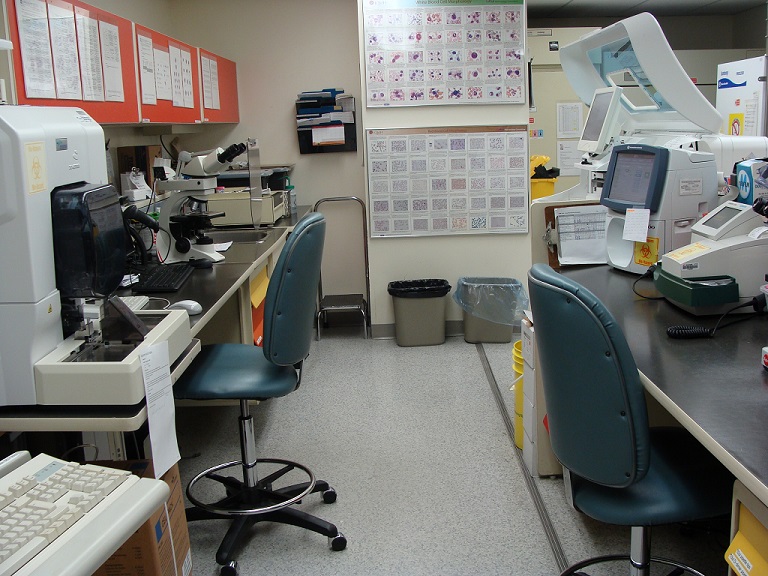Laboratory Services at CMH

All tests and procedures are conducted by qualified radiology and laboratory technologists using state-of-the-art technology. In this section, you’ll find information on the tests and procedures provided by the Hospital, booking information and details to help you prepare for your procedure and plan your visit.
Our comprehensive services are available 24/7/365 and our purpose is to provide information about your health status as it pertains to the diagnosis, treatment and prevention of disease.
Our lab is equipped with the sophisticated computerized instrumentation for timely and accurate testing, enabling our skilled team to effectively process tests, in areas such as Chemistry, Hematology, Microbiology, Transfusion Medicine, Serology, Pathology and Cytology. Ours is the only local laboratory service in our broad catchment area. The Laboratory is located on the main floor behind the Emergency Department - follow the red squares.
Out-patient testing is available: Monday to Friday 8:30 a.m. to 3:30 p.m.
Please call to book an appointment at 705-653-1140 ext. 2124.
Haematology
For the detection of changes in blood cells that may indicate disease states such as anemia, infection and leukemia. Coagulation (blood clotting) testing is also performed to monitor patients on anticoagulant therapy, to detect bleeding disorders (haemophilia) and thrombolytic disorders.
Pathology/Cytology
For the preparation of all tissue specimens and body fluids removed at surgery, by needle biopsy or aspiration for examination by a pathologist, who then makes a diagnosis.
Clinical Chemistry
For the detection of changes in bodily functions through the testing and monitoring of blood chemical constituents, drugs, enzymes, lipids, proteins and hormone analysis.
Microbiology
For the detection of disease causing organisms from a variety of body sources and includes the identification and subsequent antimicrobial susceptibility testing of bacteria and fungi.
Transfusion Medicine
More commonly known as ‘blood banking", this area of laboratory medicine deals with compatibility testing and preparation of blood and blood components for transfusion and selective treatment of various conditions.
Serology
For the detection and identification of antibodies that are typically formed in response to an infection (Mononucleosis) and other disease states (Rheumatic illness).
Cardiac Testing
For the detection of changes in the heart’s electrical activity in assessing and monitoring of a new or existing heart condition.
We provide electrocardiogram (EKG or ECG) and Holter Monitoring services to in-patients and out-patients. These services are booked through a referring physician.
An EKG is a graph produced by recording the electrical activity of the heart over time, yielding important diagnostic information related to cardiac arrhythmias and acute myocardial infarction. It also helps detect electrolyte disturbances, allows for the detection of conduction abnormalities and is used as a screening tool for ischemic heart disease during a cardiac stress test. It is also helpful with non-cardiac diseases (e.g. pulmonary embolism or hypothermia).
A Holter monitor (also called an ambulatory electrocardiography device) is a portable device for continuously monitoring the electrical activity of the heart for 24 hours or more. Its extended recording period is useful for observing occasional cardiac arrhythmias that would be difficult to identify in a shorter period of time. Like an EKG, it records electrical signals from the heart via a series of electrodes attached to the chest. These electrodes are connected to a small piece of equipment that is attached to the patient's belt, and is responsible for keeping a log of the heart's electrical activity throughout the recording period.
The data is uploaded into a computer which then automatically analyzes the input, counting EKG complexes, calculating summary statistics such as average heart rate, minimum and maximum heart rate, and finding candidate areas in the recording worthy of further study by the technician. In addition to wearing the device, most patients are asked to keep a diary of activities such as running and sleeping, symptoms, and times that their symptoms occur. This information is used by doctors and technicians to rapidly pinpoint problem areas in the vast amount of data recorded during the monitoring period.
